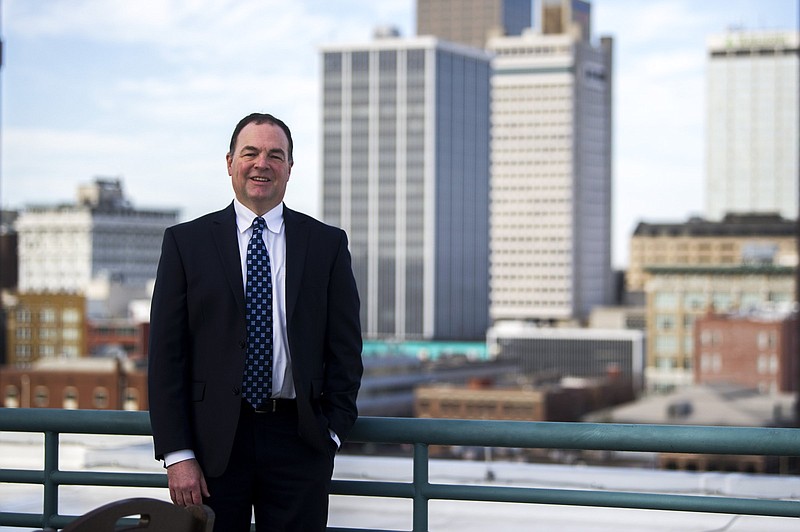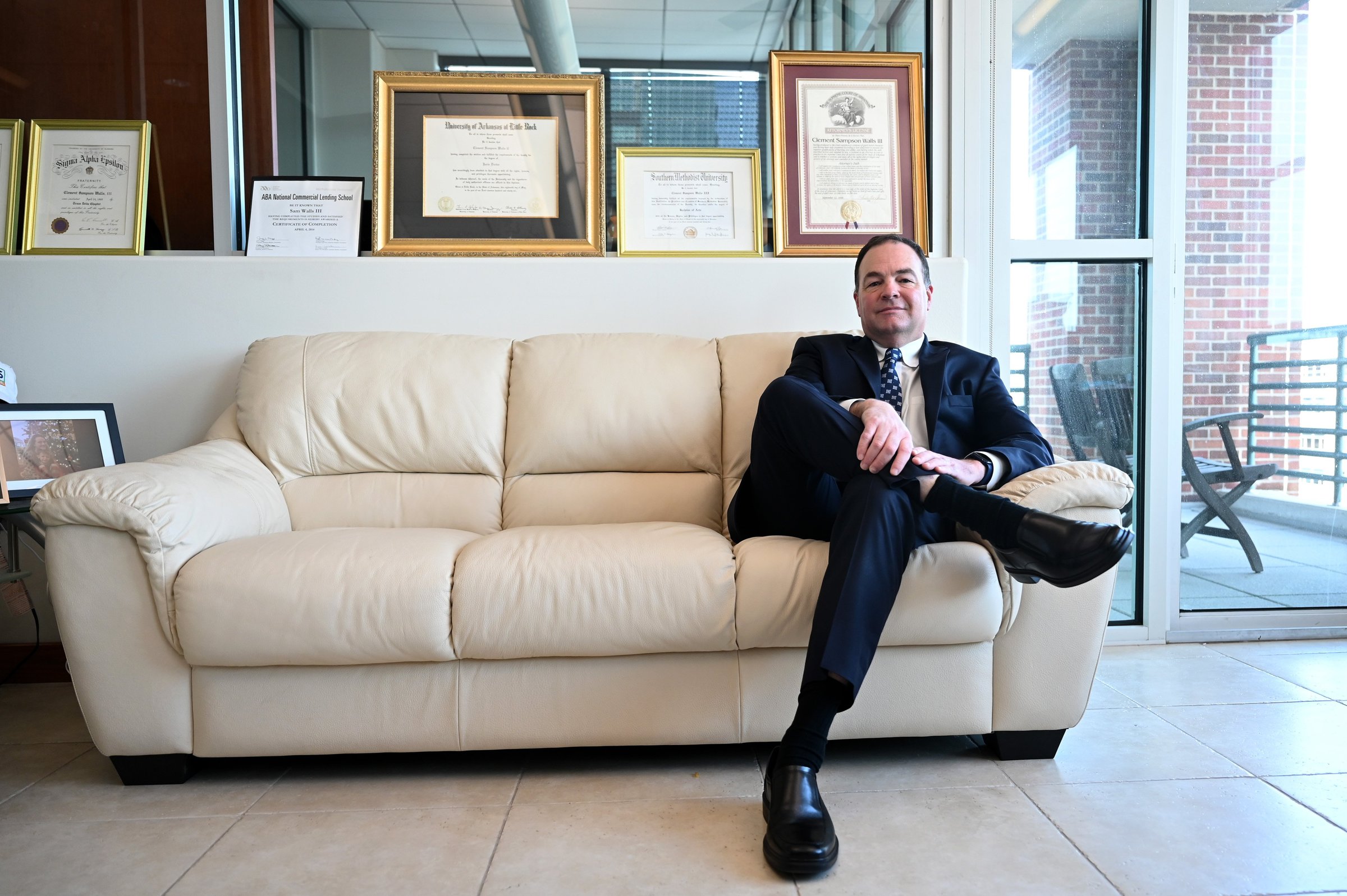Every experienced executive understands the first rule of assuming leadership over a profitable and efficient organization: First, do no harm.
That's the approach Sam Walls III is taking as he steps into the chief executive officer position at Arkansas Capital Corp., a role his dad held until retiring in 2013. Walls succeeds Rush Deacon, who has been a key executive for 25 years and remains with the company to steer project financing efforts. The transition is part of a succession plan approved last year by the Board of Directors for the 65-year-old finance company.
"The company is doing very well," Walls said of the $42 million nonprofit. "The first goal is don't mess anything up. It's kind of like the Boy Scout thing, you want to leave it better than you found it and I found it in pretty good shape. The trick is to keep the culture that we have but to keep pushing it forward."
Walls takes stewardship of an organization that has played a key role in creating jobs and financing economic development opportunities in Arkansas since its founding in 1957 by business leaders such as Winthrop Rockefeller, Witt Stephens and John Tyson. Initially, the company attracted investments from utility companies to lead Arkansas into the industrial era.
Since then, Arkansas Capital has diversified operations and has collaborated with banks, government agencies and other investors to pour more than $2.3 billion into Arkansas to save and create jobs and promote economic development in underserved communities.
"Where we've been successful is always looking at ways to diversify and continue to recognize that we can do pretty much anything as an organization that benefits the state of Arkansas for economic development," Walls noted in an interview.
The company's broad reach allowed it to set up the state's first venture capital fund in 1999, expand broadband connectivity in the mid-2000s, establish a program to facilitate foreign investment in Arkansas and take the lead in using tax credits to support economic development projects that traditional lenders can't or won't touch.
Today, the company has expanded beyond Arkansas to lift underserved areas in bordering states. For example, last year Arkansas Capital provided new market tax credits to help open a 30,000-square-foot grocery in an Oklahoma City neighborhood that had been trying for 30 years to put a deal together to lure a store to the blighted area.
In Arkansas, the company has played a pivotal role in projects such as landing the Big River Steel plant in Osceola, opening Safe Foods in North Little Rock, establishing manufacturing plants in Heber Springs and Nashville, building vocational training in Northwest Arkansas and supporting educational developments such as Arkansas Baptist College in Little Rock and the Arkansas School for Mathematics, Sciences and the Arts in Hot Springs.
The company has the flexibility to act as a direct lender or partner with agencies like the U.S. Small Business administration to offer government-guaranteed loans. Arkansas Capital operates several subsidiaries and affiliates that allow it to support entrepreneurial education efforts and development in disadvantaged areas.
"We don't look to compete with other financial efforts; we look to complement," Walls said of the organization. "There are a lot of individual silos where we can have an impact."
Last year, Arkansas Capital made more than $23 million in loans, including more than 1,200 loans valued at $76.9 million through the Paycheck Protection Program in an effort to reach businesses wrecked by the pandemic.
As a Community Development Financial Institution, Arkansas Capital was able to take advantage of PPP money that was set aside specifically for organizations that support underserved communities. The company is one of about a dozen CDFIs that operate in the state. The designation is granted by the U.S. Treasury Department and allows lenders to use government-guaranteed funds in public-private partnerships that target development of impoverished and disadvantaged communities.
"CDFIs are an extremely valuable and integral component of our financial landscape," State Bank Commissioner Susannah Marshall said. "Their specialized focus and mission for serving disadvantaged communities, promoting economic development and supporting individuals in distressed areas is of vital importance in today's world."
The CDFI designation also has helped gain SBA support in Arkansas. Over the past five years, Arkansas Capital has collaborated with SBA to inject more than $25 million in capital into the state -- not including the PPP loans that also were made through the federal agency.
Edward Haddock, SBA state director in Arkansas, noted the key role that Arkansas Capital and other nonprofit lenders have in seeding economic development and job growth.
"CDFIs have the ability to think and act differently when it comes to providing financial services, such as assessing and making loans to individuals and businesses," Haddock said. "Generally, these not-for-profit organizations have multiple funding sources varying from federal government agencies to philanthropic partners, allowing them to structure deals with a greater focus on wealth building in the communities they serve as opposed solely to loan profitability."
Moreover, Haddock says CDFIs are an essential component to building a more inclusive and diverse economy so that more people have access to vital financial services.
That's an area Walls says the company hopes to improve in the coming years with a more focused diversity, equity and inclusion program, including possibly starting a microlending initiative that the organization has never offered.
"Clearly, if you're going to make lending efforts in the DEI world, you need to look at that area," Walls said. "The idea would be to help get more capital to women and people of color. We need to be willing to take on those challenges."
Arkansas Capital's lending is geared toward loans of more than $50,000 so microlending would require a new approach. SBA defines microloans as those under $50,000 and reports that its average microloan is $13,000. The federal program has small business microloans that begin at $2,000.
As he closes in on his 19-year anniversary with the company in February, Walls also is interested in exploring opportunities in low-income housing and perhaps getting back into the venture-capital space.
"We want to find the borrowers out there who struggle to find capital through traditional means," Walls added. "We want to find ways to help and find a way to make loans work."
One thing won't change, Wall says, noting that outgoing CEO Rush Deacon will continue to serve the company in an advisory role. "Rush will continue to have an important role in our operations," Walls added.
In announcing the leadership transition last month, Arkansas Capital Chairman Kevin Burns noted in a statement that Walls "has proven himself to be a true leader and was more than ready to take this next step to the CEO role."
Deacon, who has been with the company for 25 years, is a critical component to the organization's continued success, Burns said.

